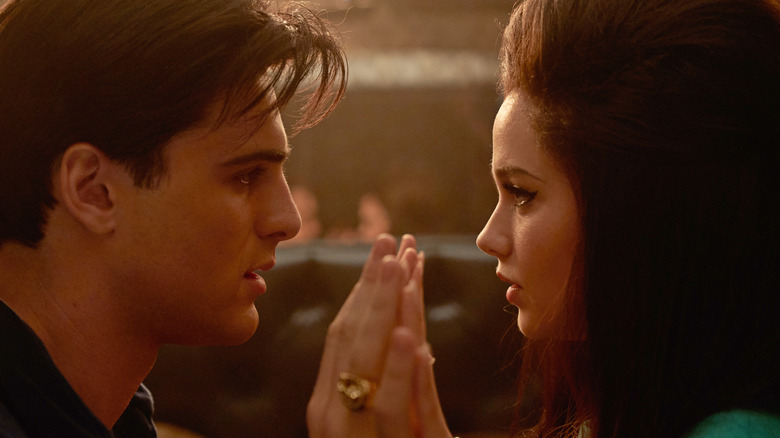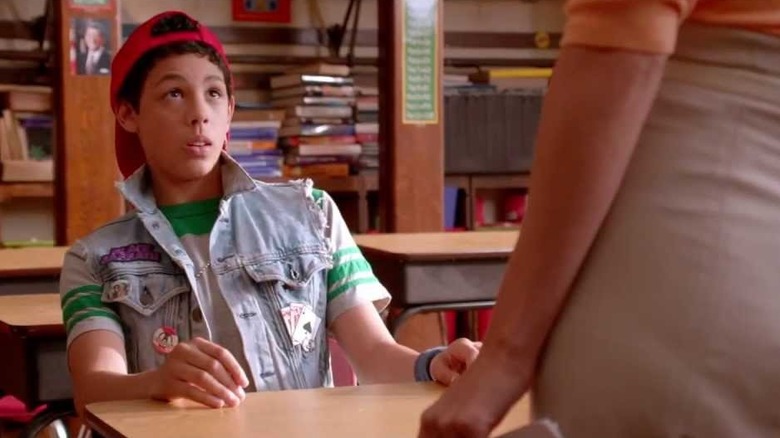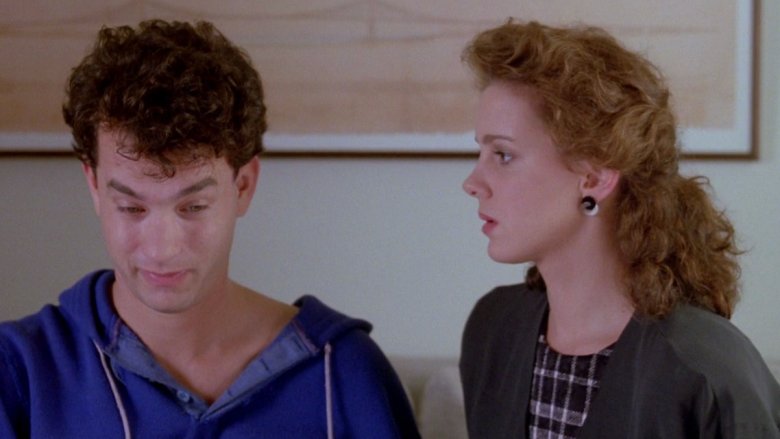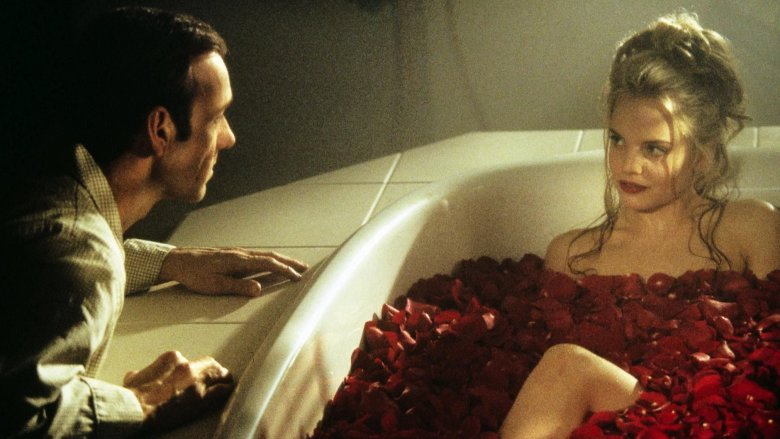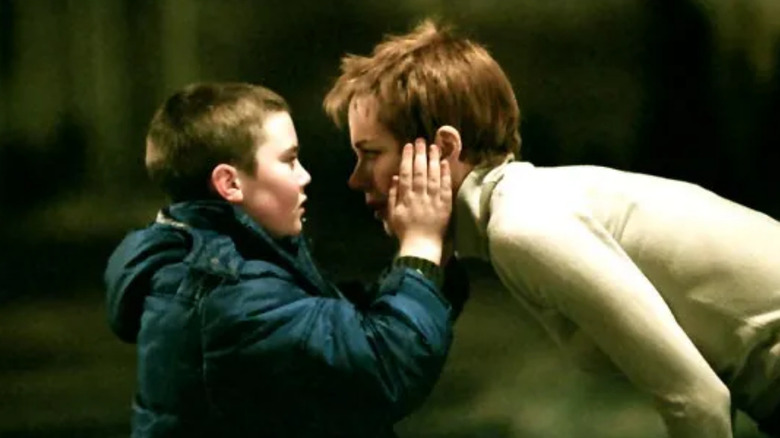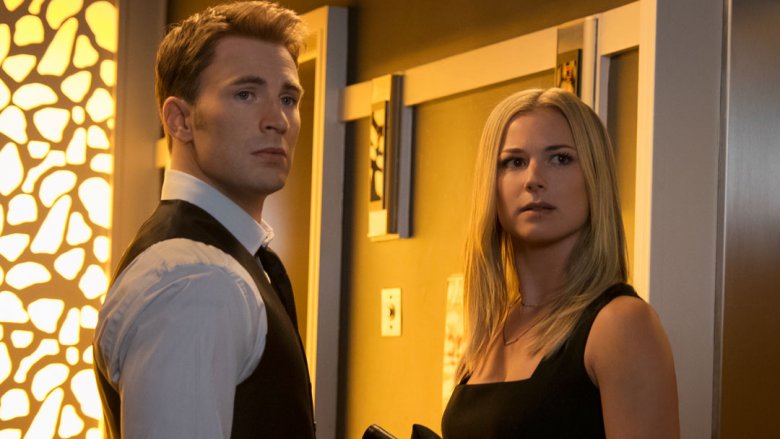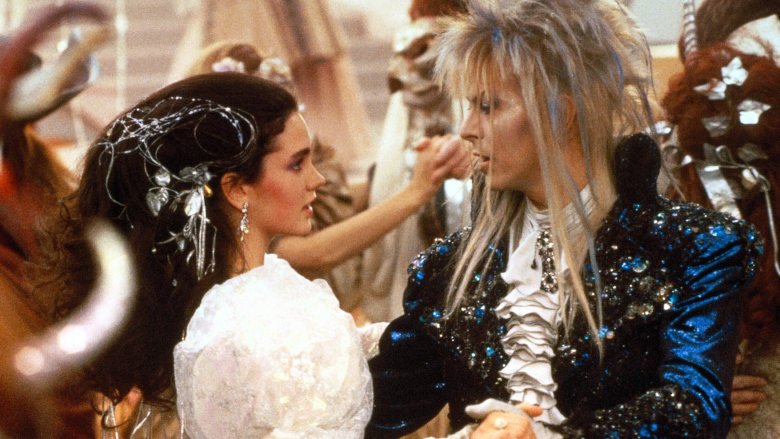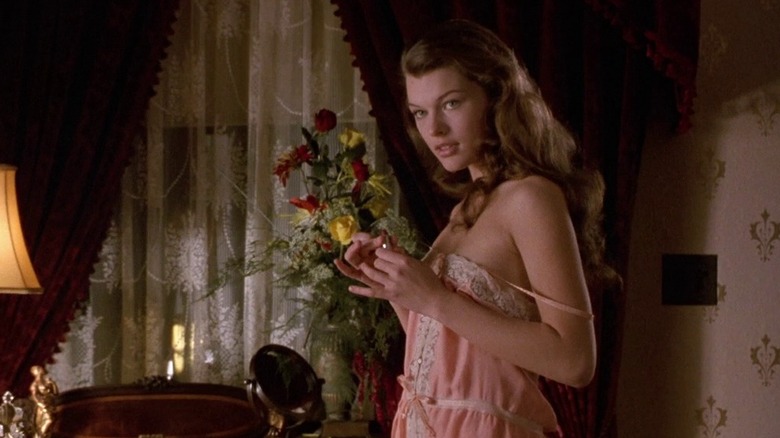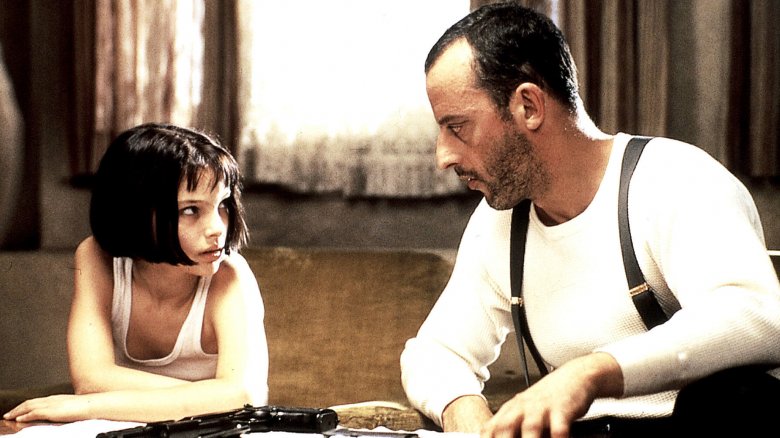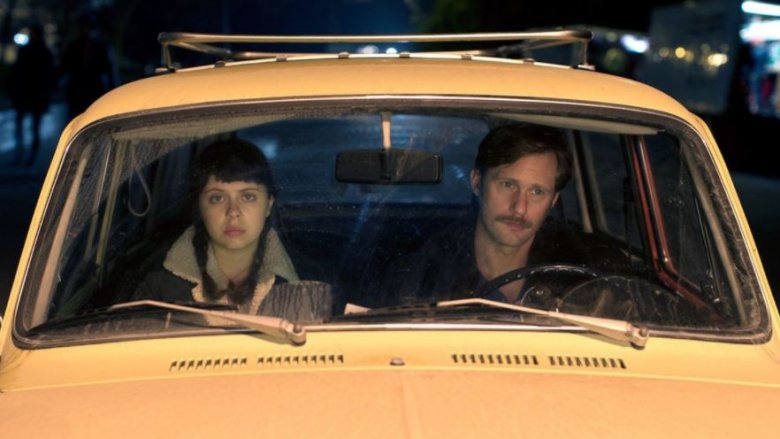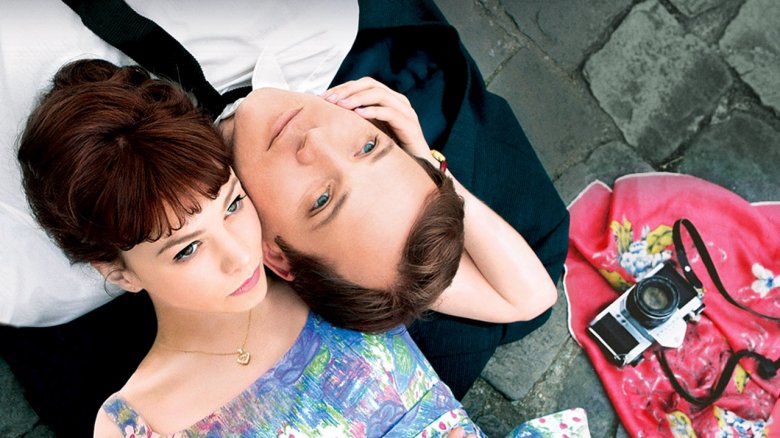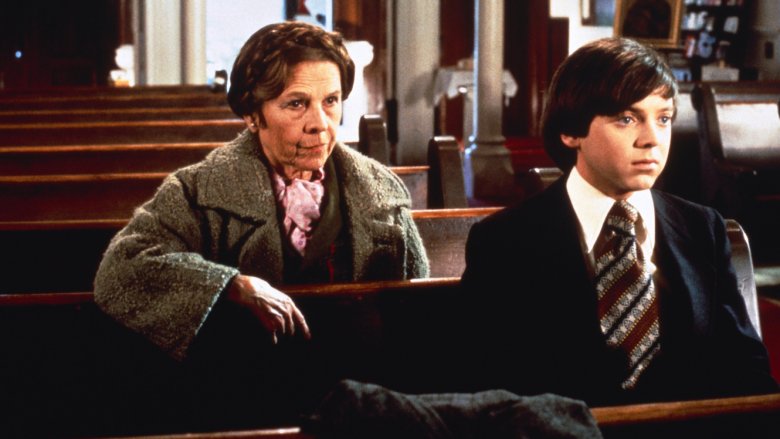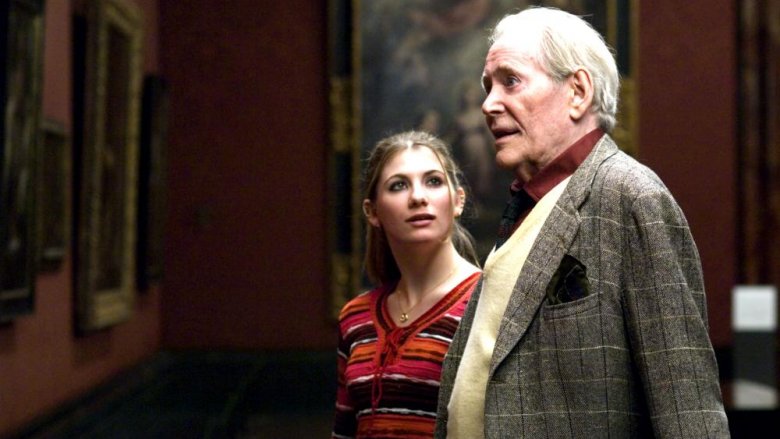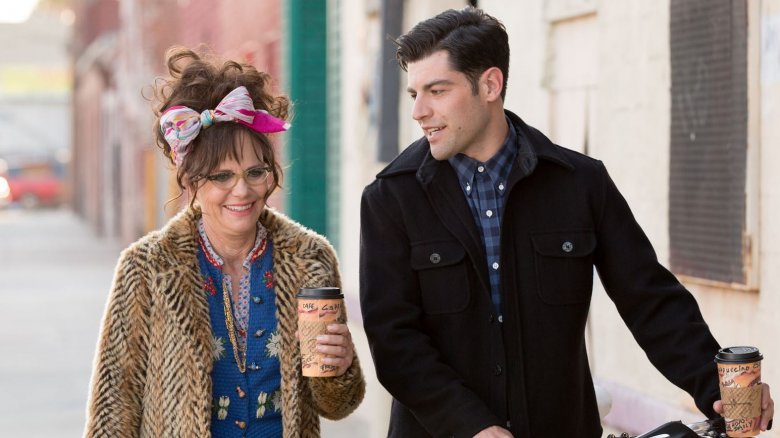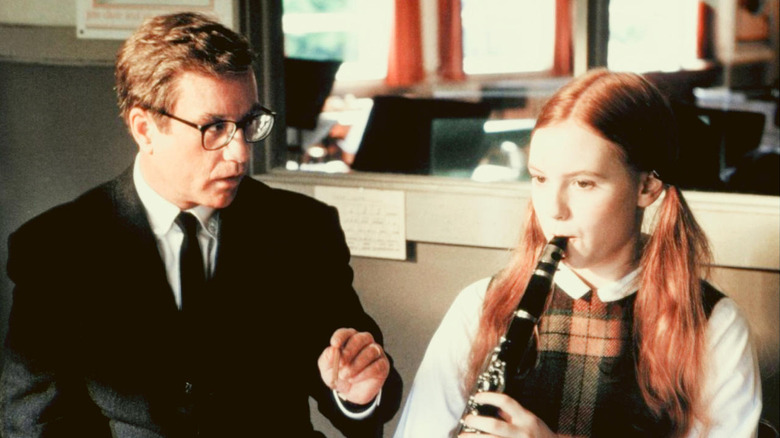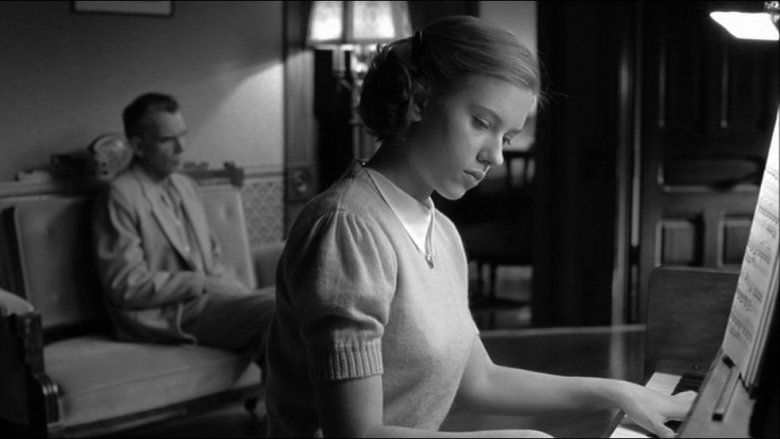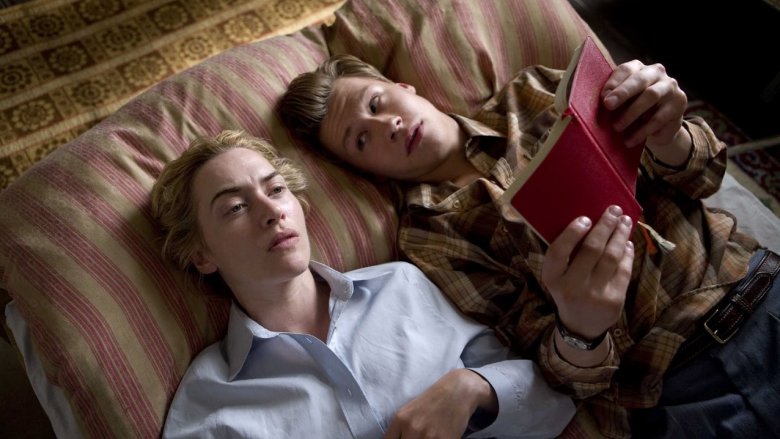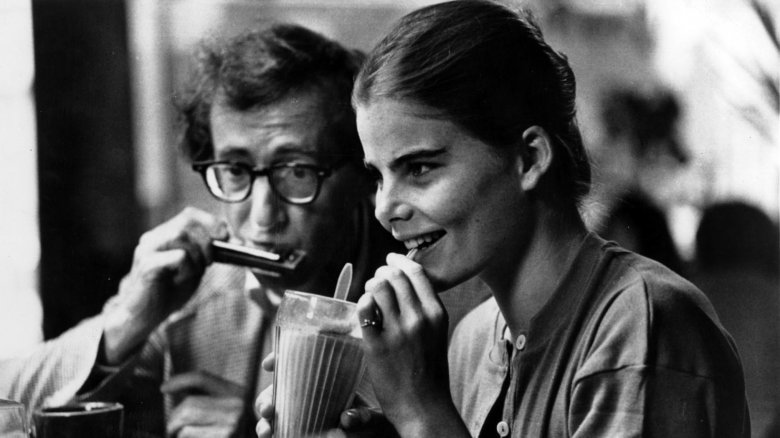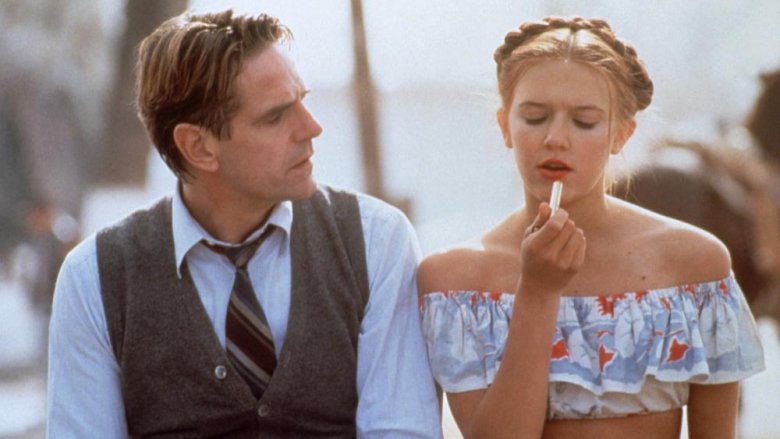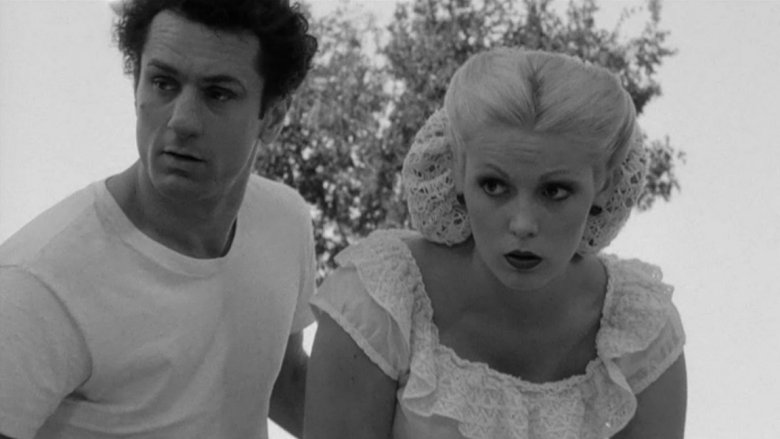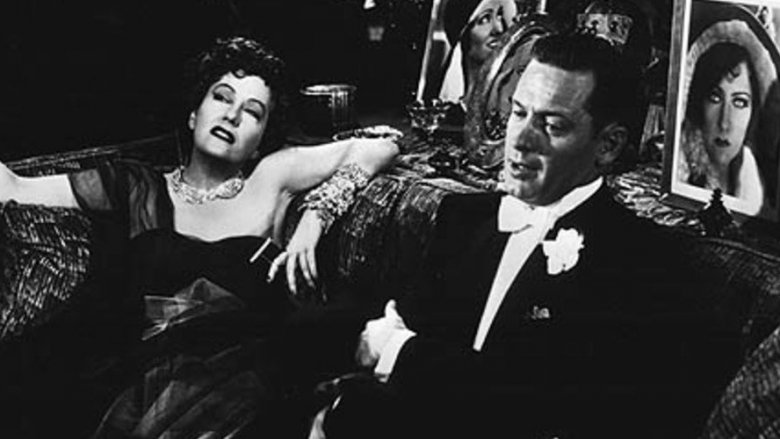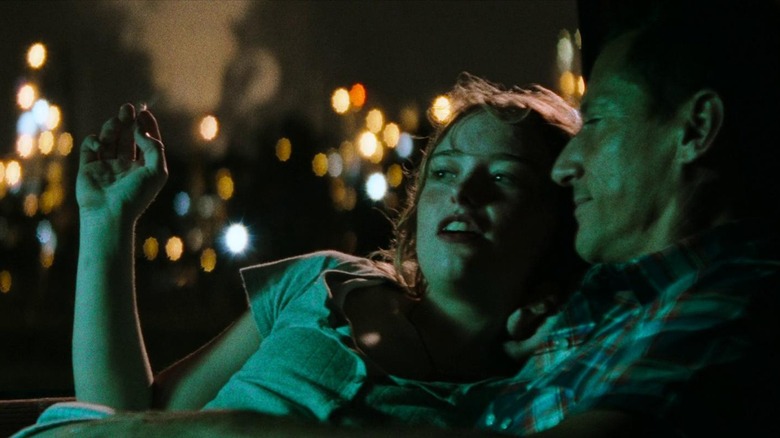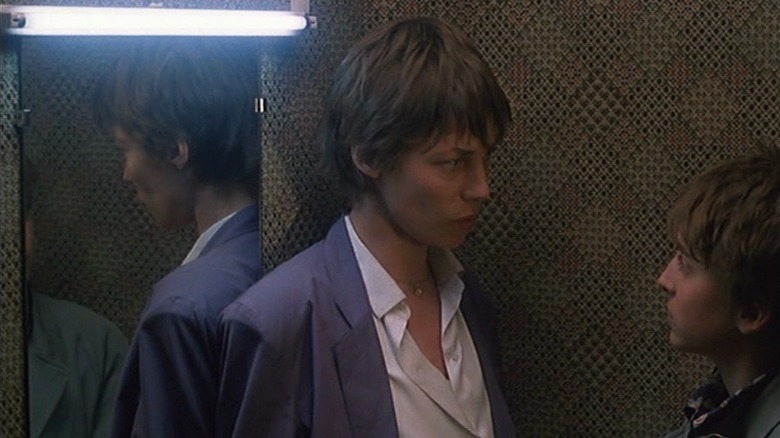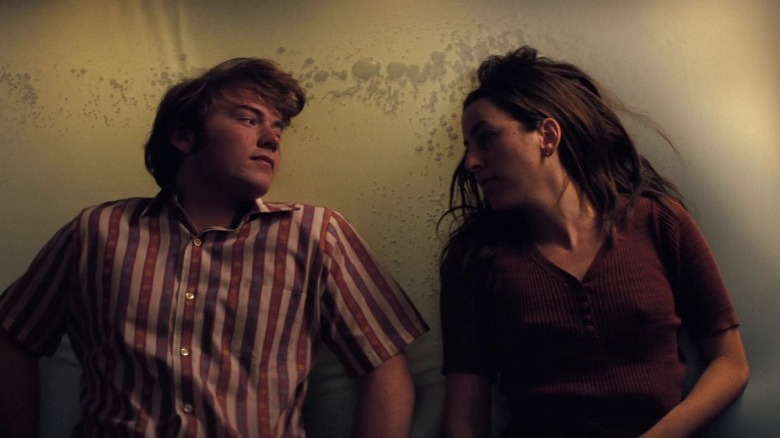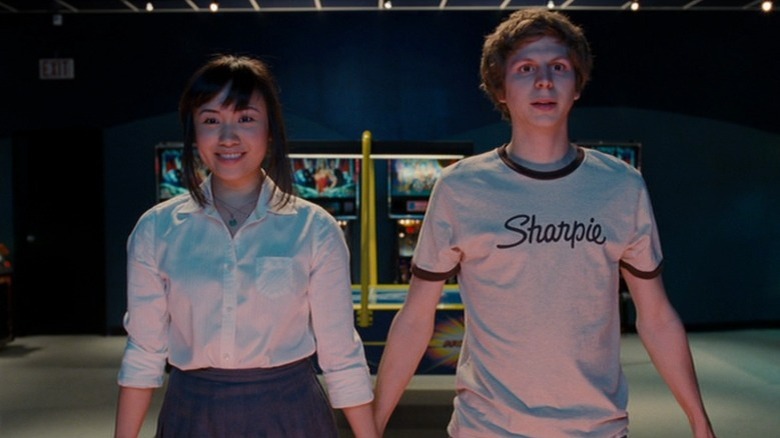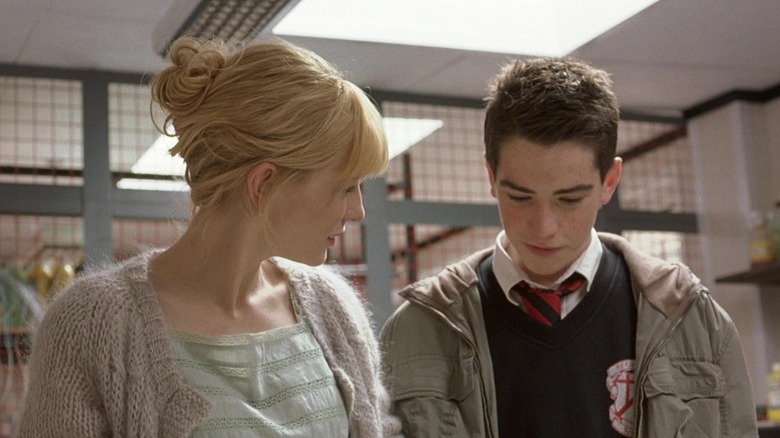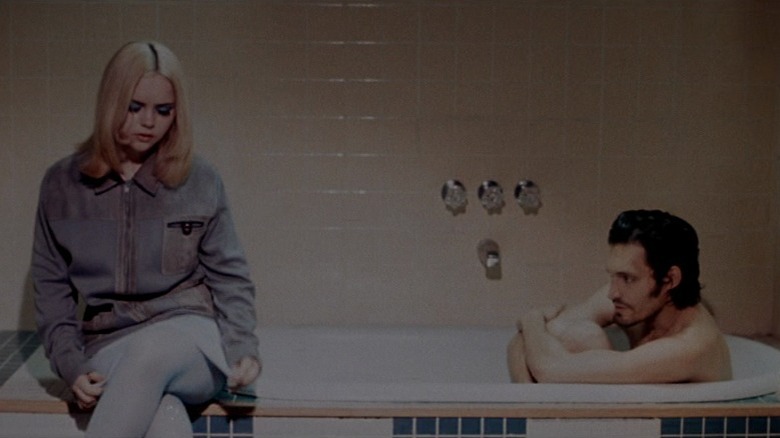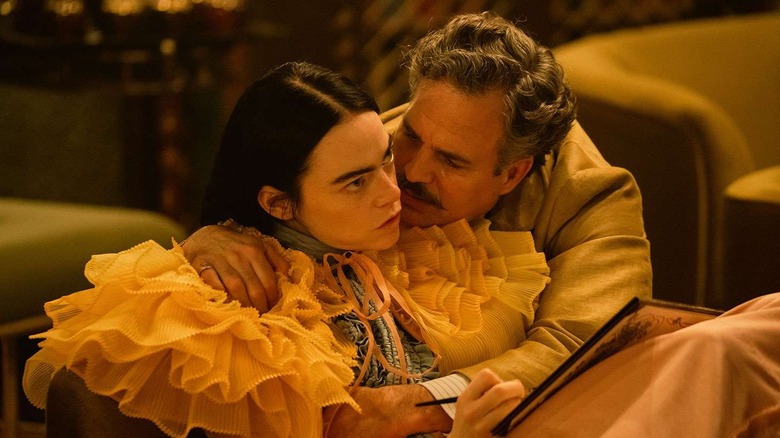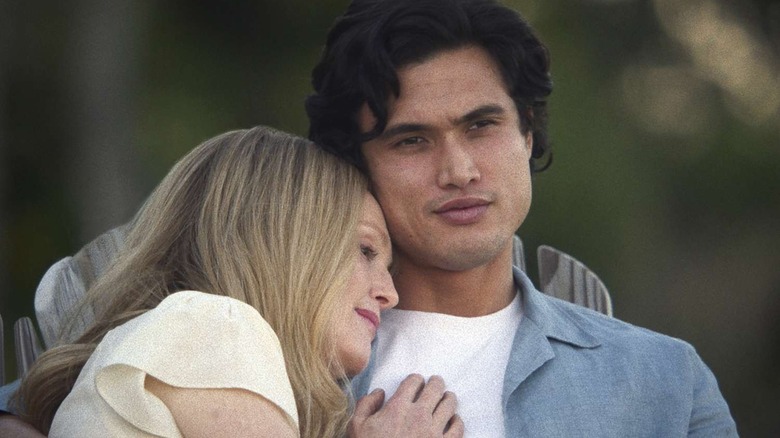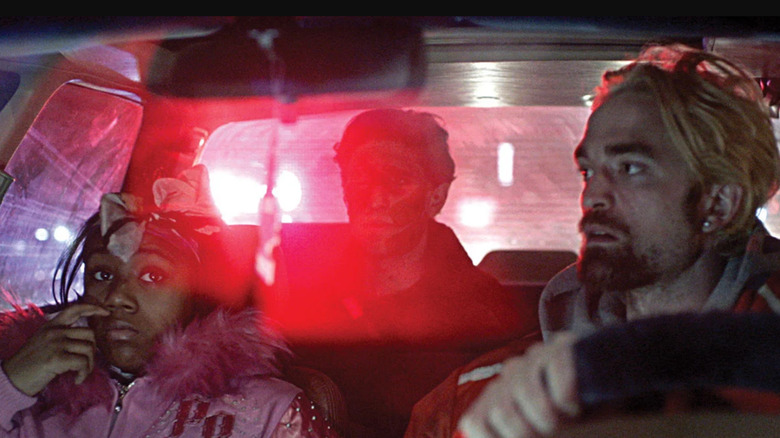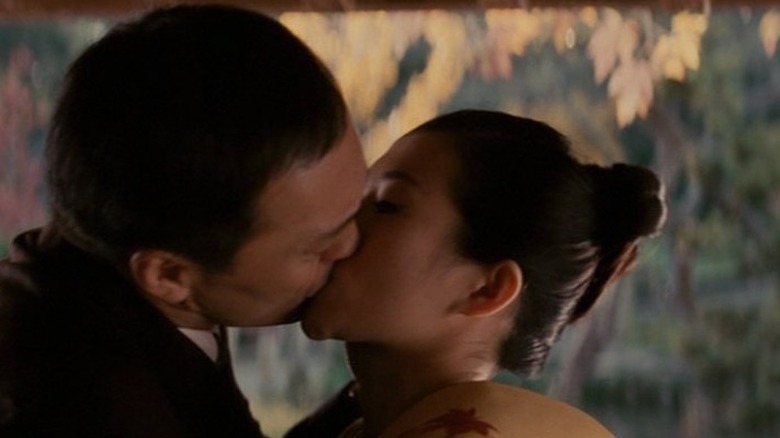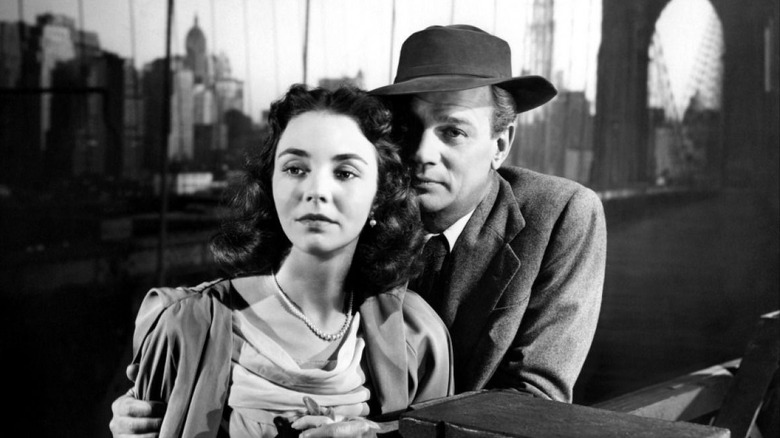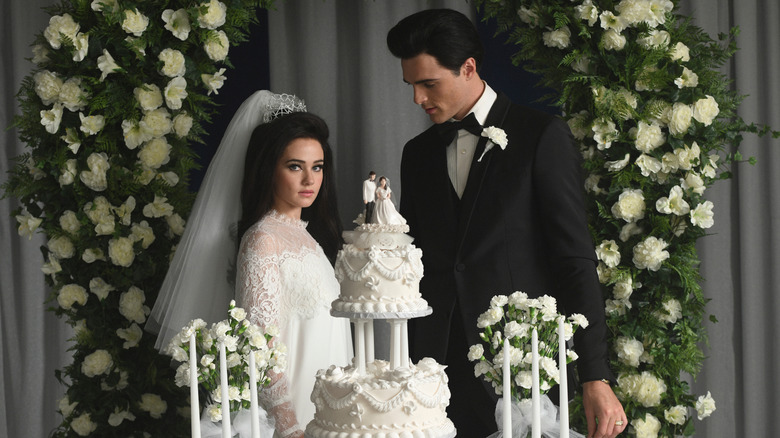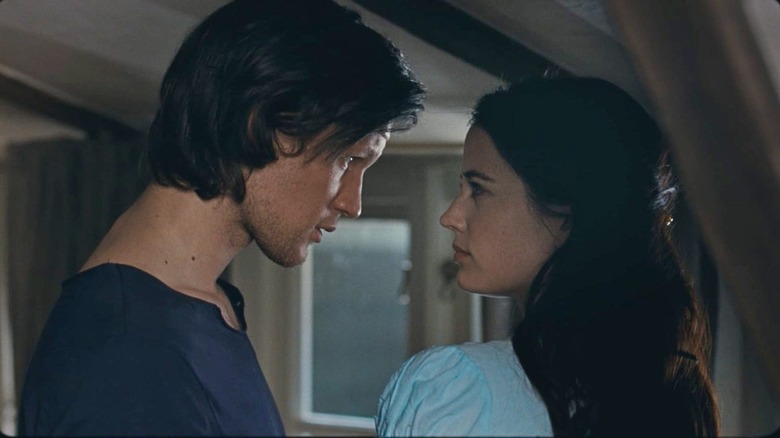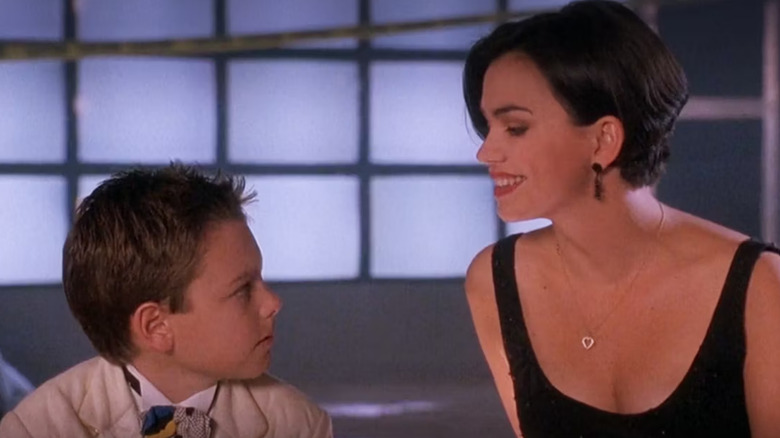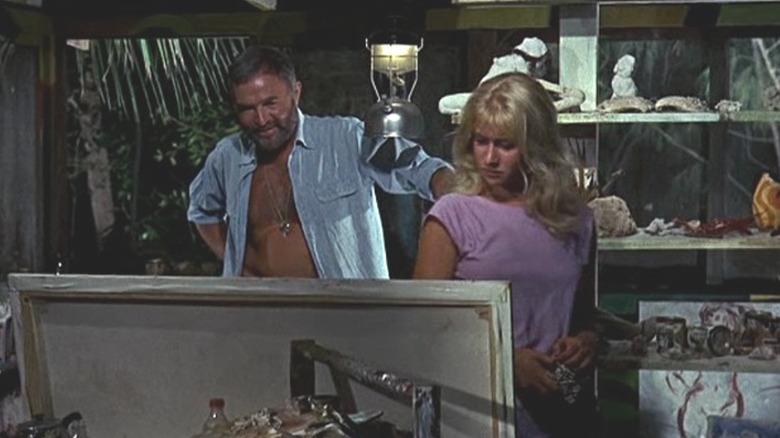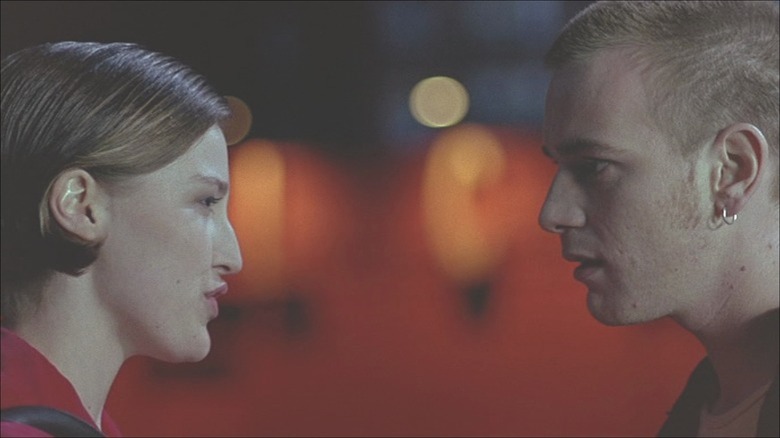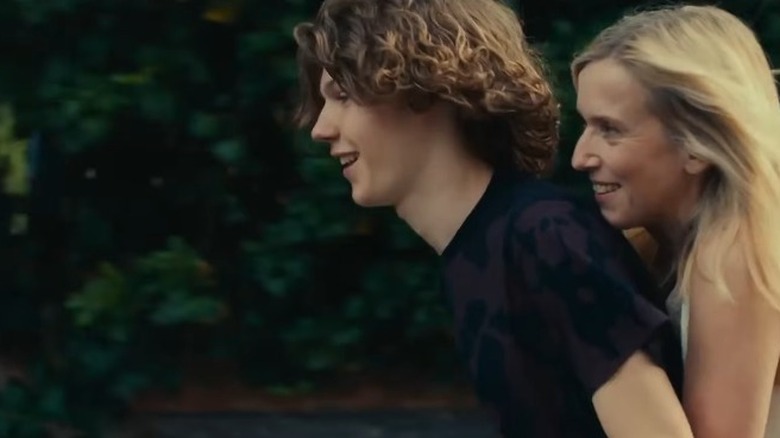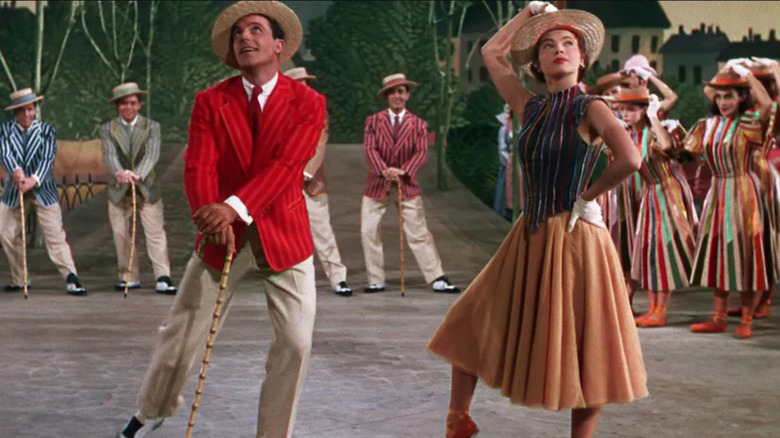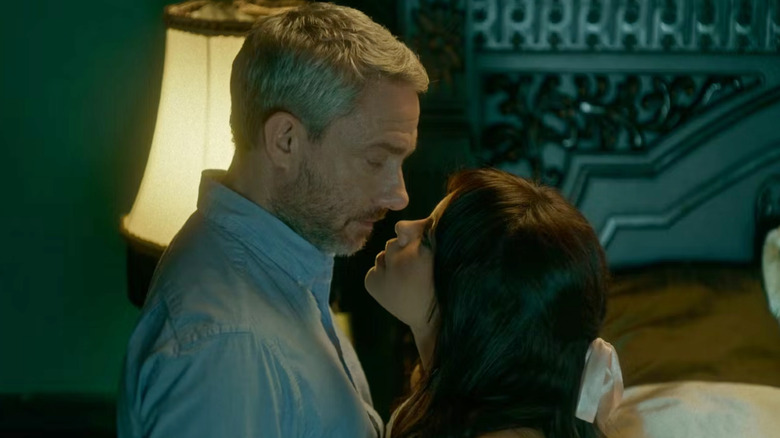The Most Uncomfortable Age Gaps In Movies
They say "all you need is love." They also say "age is just a number." But every so often when you're watching a movie, you see a mismatched couple (or at least one lovestruck stalker) taking things a bit too far. When it comes to cinematic relationships, sometimes the number of birthdays really does matter, and we get more than a little weirded out now when we see these uncomfortable age gaps in movies.
For the most part, fortunately, not all of these lopsided and wildly inappropriate relationships are portrayed with a blissful lack of self-awareness. The ones that are, in fact, often come from earlier eras in both society and filmmaking, when the age differences shown in the films of the time were simply taken at face value. Luckily, the times have changed: the vast majority of movies that feature such relationships nowadays will document them as the destructive, predatory, unhealthy situations that they truly are — with any attempts by the characters to put some kind of rationalization or justification on them seen as delusional at best and tragic at worst.
Of course, there are still exceptions even in modern times, and we'll get to a few of those as well. Either way, the movies and the age gaps we examine below are certain to make you squirm — now that we see them with clarity.
That's My Boy
Adam Sandler is no stranger to comedy that might be labeled as "questionable." But even if you're a fan, you've got to admit that Sandler didn't just cross the line in "That's My Boy" — he straight-up pole-vaulted over that sucker with a premise for this 2012 comedy that was deemed "particularly tasteless" by one review in Hitfix.
"That's My Boy" involves a younger version of Sandler's character, Donny Berger (played by Justin Weaver), hooking up with his hot teacher (Eva Amurri Martino) in detention and carrying on from there, until the relationship is discovered and the teacher sent to jail for 30 years. Just to be clear, we're talking about a 12-year-old having sex with an adult, and while the teacher is punished (and also gets pregnant), the whole thing is played as one extended naughty joke. However, as "That's My Boy" only has a 20 percent rating on Rotten Tomatoes, it seems like critics weren't in the mood to laugh.
Big
With its famous keyboard scene and great Tom Hanks performance, it's no wonder "Big" is considered a comedy classic. Directed by Penny Marshall, this 1988 flick follows a young kid named Josh (David Moscow) who morphs into a 30-year-old man. At first, this magical transformation seems pretty cool, especially when Josh is paid big bucks to play with toys for a living. But things get problematic when he starts dating Susan (Elizabeth Perkins), his adult coworker.
True, Hanks and Perkins are about the same age in real life, but in the movie, Josh is just 13. So when the two end up sleeping together, we're witnessing a serious felony offense. This illegal relationship has prompted some people to label "Big" the "creepiest story ever told" or describe the film as a celebration of "unrepentant pedophilia." While that sounds harsh, you've got to admit it's creepy at the end when Josh reverts back to his child form, and Susan waves goodbye to her 13-year-old ex.
American Beauty
It's hard to imagine now, but at the 72nd annual Academy Awards, Kevin Spacey won the Best Actor Oscar for playing Lester Burnham, a middle-aged loser who's inspired to take control of his life after falling head over heels for a high school student (Mena Suvari) in director Sam Mendes' "American Beauty." Making things even worse, she's his daughter's best friend, but Lester isn't going to let a little thing like age get in the way of his fantasies.
Sure, Roger Ebert claimed the film wasn't about a "Lolita relationship," instead saying it was really about "yearning after youth, respect, power and, of course, beauty." While that's true, some of those dream sequences still left us feeling icky, and we can't help but sympathize with Kirsten Dunst, who turned down the role of Angela because she "didn't want to kiss Kevin Spacey or be seen lying naked in those rose petals." After all, she was only 15. Don't worry, Kirsten. We totally get it, especially since Kevin Spacey turned out to be one of those actors who is a terrible person.
Birth
Directed by future "The Zone of Interest" filmmaker Jonathan Glazer, "Birth" is a pretty divisive movie that was greeted with an avalanche of jeers and catcalls when it premiered at the Venice Film Festival. Mainstream audiences weren't super happy, either. After all, the film follows an upper-class widow (Nicole Kidman) who's convinced that a 10-year-old boy (Cameron Bright) is actually the reincarnation of her husband.
At first, she's a little reluctant to believe this kid is her lost love, but as the film goes on, not only do Kidman and the kid share a kiss, they even spend a few minutes sitting in the bath together. Granted, Jonathan Glazer didn't intend for this to be salacious. Instead, he wanted to make a film about "the idea of eternal love." Still, anytime you've got a full-grown woman making eyes at a prepubescent boy, your film is probably going to bomb big time at the box office.
Captain America: Civil War
Steve Rogers (Chris Evans) and Peggy Carter (Hayley Atwell) are pretty much the perfect Marvel Cinematic Universe couple. They're brave, beautiful, and most importantly, age-appropriate. But their relationship gets tricky after Steve wakes up from a nearly 70-year-long nap and finds his old flame looking kind of elderly.
Of course, Steve is the exact same age as Peggy (a long sleep in Arctic ice does wonders for the skin), so it's a bit weird when he falls for Agent 13 (Emily VanCamp), an undercover SHIELD operative. Still, at least they both look like they're in their early 30s ... but that illusion doesn't last long, as it's later revealed that Agent 13 is Peggy's great-niece, Sharon Carter. That tiny detail makes their whole smooching scene in "Captain America: Civil War" a little uncomfortable, and even Hayley Atwell was perturbed, telling fans at 2016's Dallas Comic Con (via IGN), "I wouldn't want to date my great aunt's guy. It just feels like it crosses an incestuous boundary ... You can't tap that!"
Labyrinth
A major box office flop at the time but now widely hailed as a fantasy cult classic, 1986's "Labyrinth" is mostly famous for two things: David Bowie and David Bowie's, um, bulge. As The Washington Post put it oh-so delicately, you can make out quite a bit of anatomy thanks to the singer's "over-revelatory spandex." With all that male charisma onscreen, it's easy to see why so many people have said "Labyrinth" was the movie that kickstarted their sexual awakening.
Now, that's all fine and good ... but then you've got to remember that Bowie's character, Jareth the Goblin King, is actively pursuing a 15-year-old girl (played by a 14-year-old Jennifer Connelly). In fact, he drugs her, tries to seduce her, and begs her to "do as I say, and I will be your slave." It's a bit intense for a kid's film, to say the least, although it's nowhere near as freaky as that cackling junk lady. No matter what, it wouldn't fly today, classic or not.
Chaplin
More than 15 years before donning his Iron Man suit, Robert Downey Jr. earned an Oscar nod for his performance as legendary silent film actor and director Charlie Chaplin in Richard Attenborough's 1992 biopic, "Chaplin." As the film reveals, the real-life Chaplin was a complicated guy and something of a ladies' man ... who liked his ladies young.
Chaplin's taste for underage girls becomes pretty apparent early in the film when he marries a 16-year-old child actress named Mildred Harris (Milla Jovovich), a girl that one of Chaplin's friends describes as "jailbait." In both real life and the movie, Chaplin would then go on to marry another 16-year-old and a 22-year-old woman — who claimed to be 17 — before the 50-something comedian finally settled down with an 18-year-old.
It all gets weirder when you realize Jovovich herself was also around 16 years old when she landed the role, increasing the awkwardness of her character's nude scene with the 20-something Downey — even though a body double performed the scene in Jovovich's place.
Leon: The Professional
Directed by Luc Besson, 1994's "Leon: The Professional" is a movie that will leave you feeling a little odd. It's an awesome film, but while the relationship between Jean Reno's Leon and Natalie Portman's Mathilda isn't "inappropriate" per se, it is just a tad ... disconcerting.
The plot involves a 12-year-old girl (Portman) who asks a hitman (Reno) to get revenge on the psychotic DEA agent (Gary Oldman) who murdered her family. Leon and Mathilda's relationship starts off strange — he's childlike, she's wise for her years — and only gets weirder from there, especially when she starts crushing on Leon, dressing up as Madonna, and telling strangers this full-grown man is her lover.
It's been pointed out that Leon comes to love Mathilda — but not like that. The assassin never really deals with the situation in a mature way, but then, he's also training her to become a killer, so maybe he's not the best father figure in the world either.
The Diary of a Teenage Girl
Based on the graphic novel by Phoebe Gloeckner, Marielle Heller's "The Diary of a Teenage Girl" is meant to push boundaries and start conversations. After all, this 2015 film is about a 15-year-old girl discovering her sexuality, a subject that's rarely discussed on the big screen. However, some might argue that "Diary" takes things a bit far when its teenage protagonist winds up in bed with a 35-year-old man.
The 15-year-old in question is Minnie Goetze (Bel Powley, actually in her 20s here), a wannabe cartoonist in 1976 who loses her virginity to her mom's boyfriend, Monroe (Alexander Skarsgard). Yes, it's "consensual," but that word gets tricky when you're talking about a kid, and that doesn't make it any less uncomfortable. And sure, as IndieWire points out, this is a movie about a girl "making her own decisions, even if they're probably bad ones," but in a film that's all about breaking taboos, perhaps "Diary" broke one taboo too many.
An Education
In England, the age of consent is 16, so while the age gap at the center of "An Education" is technically legal, that doesn't make it any less unsettling. In this 2009 film written by Nick Hornby (based on the memoirs of journalist Lynn Barber), 24-year-old Carey Mulligan plays Jenny, a teenage cellist who can't wait to leave her little London neighborhood. As Jenny grows more and more restless, who should arrive but David (Peter Sarsgaard), a 30-something smooth-talker with no scruples about getting involved with a 16-year-old.
Over the course of the film, David teaches Jenny all about high society, sex, and eventually, deception. As Roger Ebert described him, David is "a rotter, a bounder, a cad, a dirty rotten scoundrel. But you can't get far in any of those trades if you're not also a charmer." Fortunately, Jenny eventually realizes this guy is a wolf in 1960s clothing, and she walks away from David a little older, a little wiser, and — you guessed it — a little more educated.
Harold and Maude
Perhaps the most famous movie ever made about May/December relationships, "Harold and Maude" was a box office failure in 1971, but over the years, it's gained a cult following. Today, it's often considered must-watch cinema, although if you're only familiar with the basic premise, you might think this is a film simply about a kid who sleeps with a woman old enough to be his grandma.
Of course, "Harold and Maude" isn't just about the sex (we don't even see anything happen onscreen). Directed by Hal Ashby, the film follows death-obsessed Harold (Bud Cort), a 20-year-old who fakes suicide and visits random funerals. Eventually, he runs into the larger-than-life Maude, a 79-year-old who teaches Harold how to live. The two gradually fall in love, and while the thought of Harold's "firm young body commingling with withered flesh" might sound unsettling at first, "Harold and Maude" is really about choosing to say yes or no, to live high or live low.
Venus
It's a sad fact that Peter O'Toole — one of Hollywood's greatest actors — never won an Academy Award (honorary ones don't really count), even though he was nominated eight times. His final nomination came for the 2006 movie "Venus," in which O'Toole plays Maurice Russell, an aging actor in his 70s who looks like death warmed over.
But things take a turn for Maurice when he's introduced to his (brace yourself) friend's niece's teenage daughter (future "Doctor Who" star Jodie Whittaker). As critic Seongyong Cho put it at RogerEbert.com, Maurice is a "fabulous dirty old man," and while he's physically incapable of getting it on, that's not going to prevent him from spending time with a pretty girl.
Of course, Whittaker's character isn't sexually interested in Maurice, but as the film progresses, the two do form a sort of bond, regardless of their whopping age gap. It's kind of sweet, but also frankly kind of skeevy, and proof that O'Toole is one of the greatest actors who never took home an Oscar.
Hello, My Name is Doris
Movies often pair aging actors like Jack Nicholson with much younger women, so it's kind of refreshing that "Hello, My Name Is Doris" has Sally Field chasing after a much younger guy for a change. In this 2016 comedy directed by "The Big Sick" and "The Idea of You" helmer Michael Showalter, Field plays a 60-something eccentric who, following the death of her mother, lives the life of a loner until a self-help speaker inspires her to pursue her 30-something co-worker, John (Max Greenfield).
Sadly, things get uncomfortable as we realize that John — who's a good guy — just isn't interested. Unfortunately, Doris is blind to the truth and spends her time dreaming about romantic episodes with her decades-younger love interest. All of this culminates in one of cinema's most cringeworthy confessions of affection, one that'll leave you feeling absolutely awful for both Doris and her unrequited crush.
Mr. Holland's Opus
You could describe the title character of 1995's "Mr. Holland's Opus" (Richard Dreyfuss) as a frustrated guy. Sure, deep down in his heart, he loves teaching kids about music, but he only got the gig to make ends meet. His "real" goal in life is to compose classical music, but that's not working out so well. Things at home aren't that great either, as he's growing distant from his wife and struggling with the fact that his son was born deaf.
So when a gorgeous student (Jean Louisa Kelly, who also appeared in "Uncle Buck") auditions for his upcoming Gershwin revue, well, middle-aged Mr. Holland suddenly gets his groove back. The girl serves as his musical muse, but the situation gets trickier when the clearly twitterpated student asks her gray-haired teacher to run off with her to New York. Being a good dude, Mr. Holland gently turns her down ... but you can tell he was totally considering it for just a second.
The Man Who Wasn't There
If you've ever seen a Coen brothers movie, you know these guys are masters of the absurd, and in "The Man Who Wasn't There," the directors take their zaniness up to 11, filling their film with UFOs, electric chairs, and uncomfortable car rides with teenaged girls.
This black-and-white noir follows Ed Crane (Billy Bob Thornton), a laconic barber who winds up in a murderous blackmail scheme (you've just got to watch it) before running into teenage pianist Rachel "Birdy" Abundas (Scarlett Johansson) and deciding to help her become a world famous musician.
Of course, as EW's 2001 review of the film pointed out, Ed and Birdy's "relationship is tinged with an erotic undercurrent," and while Ed never acts on his illegal impulses, we can't say the same for Birdy. But hey, this is film noir — and she's underage — so this car wreck of an affair doesn't exactly pan out as Birdy planned.
The Reader
When asked by the folks at Coming Soon if she ever worried about appearing in movies like "The Reader," a film about statutory rape, Kate Winslet replied, "I've got to tell you, I'm so offended by that ... To me, that is absolutely not this story at all. That boy knows exactly what he's doing."
With all due respect to the Oscar winner, that excuse wouldn't fly in a court of law. And if we want to get technical, "The Reader" is totally about statutory rape ... and Nazis.
The film follows 15-year-old Michael Berg (David Kross), who gets involved with 36-year-old Hanna Schmitz (Kate Winslet). When the two aren't making love, he's constantly reading to her (she's illiterate), thus the title of the movie. But their affair takes a nosedive when Michael discovers Hanna used to work as a concentration camp guard. In other words, this just might be the unhealthiest relationship on this entire list for reasons that have nothing to do with age.
Manhattan
"Manhattan" is widely considered one of the greatest movies ever made. It's also a film about Woody Allen dating a 17-year-old. Allen plays a 40-something comedy writer named Isaac Davis who's involved with a high school girl named Tracy (Mariel Hemingway) — the guy even finds it amusing when his girlfriend ends a date because she has to study for a test. "I'm dating a girl who does homework," Isaac jokes, but it's hard to chuckle along.
Still, the 1979 movie is well-made — perhaps the most beautifully-filmed movie set in New York City of all time — and Hemingway received an Oscar nomination for her work. However, it seems the events of the film followed her into real life. According to Hemingway, after she turned 18, Allen showed up at her house and allegedly tried to convince her parents to let her accompany him to Paris. Evidently, Allen didn't have quite the same allure he did onscreen, because the teenager shot his plans down and sent him packing.
Lolita (1962/1997)
Vladimir Nabokov's "Lolita" is almost unanimously hailed as one of the best novels of the 20th century, but it's not what you'd call light reading. Sure, the writing is beautiful, but the subject matter is a bit on the dark side. Nevertheless, the novel inspired two separate movies, Stanley Kubrick's 1962 version, starring James Mason and Sue Lyon, and Adrian Lyne's 1997 adaptation, featuring Jeremy Irons and Dominique Swain.
Both movies focus on Humbert Humbert (Mason, Irons), a middle-aged professor who finds himself inappropriately attracted to young girls. He sets his sights on the titular Lolita (Lyon, Swain), renting a room in the boarding house where she lives with her mother. When Lolita's mother dies after discovering Humbert's attraction to her daughter, Humbert can finally act on his desires. Both Lyon and Swain were in their early teens when cast in their respective roles, and naturally, the subject matter stirred up some controversy. Of course, it's not like Humbert is supposed to be a hero — and don't worry, he eventually figures what the term "jailbait" really means.
Raging Bull
An illegal, inappropriate, and ultimately abusive relationship is at the heart of 1980's "Raging Bull," another film that is widely acclaimed as one of cinema's all-time greats. Jake LaMotta (Robert De Niro) is a man who takes what he wants, and if he doesn't get it, he'll probably just beat it to death. A professional boxer with heavy hands and a short temper — bordering on psychotic — this 20-something pugilist is, as the title of this Martin Scorsese-directed masterpiece implies, an angry animal that is never satisfied or happy.
So when he spots Vickie, a 15-year-old blonde bombshell (Cathy Moriarty), at the city pool, he decides right then and there that's he going to have her — even though he's already married. After all, he's Jake LaMotta, and he's not going to let the law or his current wife stand in his way. At first, Vickie is only too happy to hook up with the middleweight mauler, until she realizes that his jealousy is all-consuming and that he doesn't stop swinging once he steps out of the ring. Their relationship starts from the wrong place and only goes downhill, mirroring Jake's fortunes.
Sunset Boulevard
When it comes to May/December relationships, there's no couple quite so eerie as Norma Desmond (Gloria Swanson) and Joe Gillis (William Holden). In this Billy Wilder classic, Joe is a screenwriter who runs into Norma, a fading starlet, completely by accident. But once he steps inside her mansion, there's no getting away. Norma is like a spider, and Joe is the fly. Of course, so long as she's paying for his suits and keeping him comfortable, he can't really complain much.
Norma is about 50, and Joe is half her age (Holden was 32 when he played the role). However, the actress is completely lost in the past. Her dusty mansion is a shrine to her faded career, and she spends her evenings watching her own movies from Hollywood's silent era. In other words, Norma might still have a few birthdays left, but she feels absolutely ancient. As Roger Ebert pointed out, Norma "has aged not in the flesh but in the mind," and when Joe decides it's time to date someone his own age, he discovers you can't walk away from a movie star that easily.
Red Rocket
A lot of films about romantic relationships between adults and teenagers leave the exploitation factor implicit. Sometimes, it even externally appears as though things could be functional, with at least a pretense towards mutual respect and balance — a love that seems genuine and fair, and then slowly lets on its more unseemly aspects as the exploited party themselves becomes conscious of them. But then there are also movies like Sean Baker's "Red Rocket," in which the grown-up's "love" extends to ... pressuring the teenager into embarking on a career in porn.
If it's not clear just from that description, 2021's "Red Rocket" is very much one of those movies that doesn't shy away from taking the full measure of a horrible person. Mikey "Saber" Davies (Simon Rex), a former porn star and current floundering deadbeat, is an all-around nightmare of a person, but he doesn't reveal the depths of his cynicism until he starts going out and having sex with the rudderless Raylee, a.k.a. Strawberry (Suzanna Son), a 17-year-old clerk at a local donut shop. If the idea of a middle-aged man romantically and sexually preying on a minor troubles you, worry not: He also intends to prey on her professionally, viewing Strawberry as his ticket back to glory in his former industry. While incisive and scathingly funny as a character study, "Red Rocket" gets harder to watch the more vividly it paints Mikey.
Kung-Fu Master!
There's thorny, and then there's 1988's "Kung-Fu Master!," a film in which the great Agnès Varda directs her own teenage son Mathieu Demy in a story that has his character live out an affair with a woman played by the very adult Jane Birkin. Conceived on-camera by Birkin during the filming of the legendary 1988 documentary "Jane B. par Agnès V.," the film is just what it says on the tin: A romance — structurally and nominally, albeit far from sincere — between the 40-year-old Mary-Jane (Birkin) and the 15-year-old Julien, a classmate of Mary-Jane's daughter (Charlotte Gainsbourg) with whom she develops a seemingly inexplicable obsession.
Even though the film is persistently aware of how twisted and damaging such a predatory relationship would inevitably be even at its breeziest, Varda makes a point of sidestepping mere judgment. Instead, she seeks to understand and deconstruct Mary-Jane, asking just what it is that a grown woman could possibly be getting out of a "relationship" that reduces her to scouting arcade cafés for possible date spots. Although the tone is deceptively sunny as in much of Varda's darkest oeuvre, swirling under the surface are knotty themes like adult dysfunctionality, cultural chauvinism, toxic nostalgia, the twilight of the sexual revolution, and even the toll of the HIV/AIDS epidemic — all expressed through a "love story" that's really anything but.
Licorice Pizza
A lot of Paul Thomas Anderson's "Licorice Pizza" is perched right on the cusp of full-on creepiness. Depicting 15-year-old Gary Valentine's (Cooper Hoffman) relationship with 25-year-old Alana Kane (Alana Haim, in a performance co-star John C. Reilly has compared to acting legend Joaquin Phoenix) as a friendship first and foremost, the 2021 movie avoids fully tipping its hand for most of its runtime. And, as friendships go, it's hard to deny that Gary and Alana's is a tender, captivating, sensitively-observed one — two people in different stages of life somehow bonding over their shared directionlessness and fear of the future. Even when they feel jealousy or desire for each other, such feelings can almost seem incidental and secondary to their connection.
In the end, though, they get together. And it's not that the movie outright ignores or misrepresents the oddity of their age gap — their big climactic argument is, in fact, centered around it — but it still ultimately seems to view it as no big deal, or at least not an impediment to a pretty unambiguous, run-off-into-the-night happy ending. Anderson is probably the most gifted American filmmaker working, and no one in Hollywood can pull off a tricky balancing act quite like he can. But even some of his fans had trouble getting past the core storytelling decision of "Licorice Pizza."
Scott Pilgrim vs. The World
Whether in comic, cinematic, or animated form, "Scott Pilgrim vs. The World" is one of those pieces of media that just seems cursed to be chronically misunderstood by audiences. Not only do some viewers of the 2010 live-action Edgar Wright film relate uncritically to the titular character and fail to see how much his selfishness harms the people around him, but a lot of people believe the movie itself has that same attitude. Which is far from the case — as demonstrated by the way "Scott Pilgrim" depicts Scott's (Michael Cera) utterly imbalanced relationship with Knives Chau (Ellen Wong).
The problem starts with the age gap: While Scott is a 22-year-old for whom adulthood has long since reared its head, Knives is a 17-year-old high school student who idolizes Scott. Then there's the corollary to that problem: Because Scott is sheltered and emotionally arrested, he believes he can pass himself off as being on Knives' maturity level, even as all his bandmates, his sister Stacey (Anna Kendrick), and his roommate Wallace (Kieran Culkin) insist that he's being delusional. Unsurprisingly, he shrugs off Knives' feelings after falling for Ramona (Mary Elizabeth Winstead), blithely cheats on both girls simultaneously, and then discards Knives the moment it's convenient for him. It takes the whole movie for both Scott and Knives to understand the extent to which he has taken advantage of her throughout their relationship. Thankfully, the movie itself is never less than sharply aware of that.
Babyteeth
If there's one movie where the discomfort of the central age gap is a key component to the emotional tension, it's 2019's "Babyteeth." The Rita Kalnejais-scripted, Shannon Murphy-directed Australian indie stands out mightily from the past decade's crop of teen cancer weepies by posing a truly heady what-if: If your 16-year-old daughter was dying, would you allow her to relish her last chance at love in the arms of an irredeemable older dirtbag?
The way that the characters of "Babyteeth" navigate that conundrum proves consistently surprising and compelling. Milla (Eliza Scanlen) herself is aware of the messiness, but struggles to push through it; her parents (Ben Mendelsohn and Essie Davis) continually challenge and circumvent their own instincts to grant Milla what will make her happier and more fulfilled in the time she has left; the 23-year-old Moses (Toby Wallace), meanwhile, vacillates between his tendency to callously take advantage of any goodwill he's afforded — stealing from Milla's family to buy drugs, for instance — and his desire to be a decent boyfriend and human being who truly makes Milla happy.
With that setup, the movie inverts the typical polarity of age-gap stories, placing all the emphasis and all the characters' efforts into fulfilling and attending the needs of the vulnerable party. It's not exactly romanticization so much as a frank reckoning with an odd, fraught, unstable, yet deeply human situation.
Notes on a Scandal
Risky, lurid, and campy like so few mainstream movies allow themselves to be nowadays, Richard Eyre's "Notes on a Scandal" is among the few truly memorable psychological thrillers of the 2000s. Its appeal largely comes down to the sheer juiciness of its premise: Lonely, embittered, misanthropic elderly teacher Barbara Covett (Judi Dench) develops an obsessive infatuation with her younger new colleague Sheba Hart (Cate Blanchett, easily giving one of her 12 best performances ever).
The depiction of elderly queer sexuality in such frontal, abrasive terms is striking enough, and to be sure, the age gap between Barbara and Sheba is pretty alarming for a one-sided attraction. But the really disturbing age gap that the movie hinges on is the one between Sheba and her 15-year-old student Steven Connolly (Andrew Simpson).
The 2006 film depicts that "relationship" as properly catastrophic — a dangerous, destructive compulsion that Sheba can't seem to let go of. Ingeniously, it also makes perfect fodder for a moral tennis match between herself and Barbara. At first, Barbara has the high ground, merely harboring an attraction that does not, in and of itself, hurt anybody, whereas Sheba is being actively predatory; Barbara then tries to use Sheba's secret to manipulate and exploit her, and things get increasingly murkier — and uglier, and more sordid, and more desperate — from there. It's discomfort as the ideal fuel for vicious entertainment. They don't make 'em like this anymore.
Buffalo '66
The films of Vincent Gallo pair his caustic and unabashedly unlikable screen persona with eminently charismatic actresses, then explore the ensuing contrasts to the fullest. This captivates some viewers and alienates others; Roger Ebert famously named one of his movies the worst in the history of the Cannes film festival. No film pushes those contrasts to a more harrowing extreme than his 1998 breakthrough "Buffalo '66," which depicts Gallo's character, Billy Brown, being saved by the selfless love of his teenage kidnap victim, whom he's forcing to pretend to be his girlfriend.
Layla (Christina Ricci) herself is an effervescent movie character, enthralling to the same degree as she's utterly unrealistic, largely thanks to Ricci's supernova performance. And part of the film's appeal, at least to those who do in fact like it, stems precisely from the iffiness of the premise. Gallo is pretty much challenging himself to make a love story compelling under the most repulsive possible circumstances, piling up reasons to view it as predatory — the kidnapping, the huge age gap, Billy's selfishness and aggressiveness, Layla's complete lack of anything resembling humanity — and then looking for ways it can still be somehow touching.
Whether he succeeds or not is up for discussion, of course; if you give "Buffalo '66" a go and end up running away screaming at the halfway mark, unwilling to humor Billy's sheer toxicity for another minute, not even the film's fans are likely to blame you.
Poor Things
Not only is the "age gap" in Yorgos Lanthimos' "Poor Things" uncomfortable, but it's genuinely bizarre, and difficult to even wrap one's head around. The whole premise of the 2023 film is that eccentric scientist Godwin Baxter (Willem Dafoe) has transplanted the brain of a newborn into the body of an adult woman, thus creating Bella Baxter (Emma Stone), who is neither entirely one nor the other. Bella speeds much more quickly than a toddler through each developmental stage — which doesn't make it less discomfiting when she becomes aware of her body's fully mature sexual functions, and charges right into that aspect of life by initiating an affair with the smooth scoundrel Duncan Wedderburn (Mark Ruffalo).
Although Duncan is not privy to the precise nature of Bella, he understands that she's different from other humans, thinking and behaving more like a young teenager at the time they meet. Indeed, this is what attracts him to her: Duncan idealizes and exploits Bella's naiveté, purity, and lack of shame, introducing her to sex in all its variety while insisting she must avoid developing feelings for him. The discomfort inspired by their tryst is very much intentional; at first, it appears as though Duncan is treating Bella like his personal plaything. Then, as the movie progresses and Bella keeps maturing at a stunning clip, she outgrows Duncan entirely, the scope of her sexual interests extends beyond him, and he is turned into a jealous, sobbing, shrieking, possessive, pathetic mess.
May December
Todd Haynes' "May December" is a metafictional treatise on cruelty, selfishness, denial, the stories people tell themselves in the name of self-justification, and the world's way of absorbing and normalizing all horrors. Although the protagonist is Natalie Portman's Elizabeth Berry, an actress doing research for an upcoming independent film, the juice of the story is concentrated in the relationship between Gracie Atherton-Yoo (Julianne Moore), the 59-year-old woman whom Elizabeth is studying, and her 36-year-old husband Joe Yoo (Charles Melton).
There are never any flashbacks to the beginning of Gracie and Joe's relationship, but we gradually learn that they met as coworkers in a pet store when Gracie was 36 and Joe was 13; that Gracie got pregnant with Joe's child; that she was arrested for statutory rape; and that, after she left prison, they got together again and formed a seemingly happy nuclear family. When Elizabeth arrives in town to learn about said family, they appear superficially normal and stable: Decades of rationalization have allowed Gracie to view herself as an innocent ingénue whose love was tragically misunderstood by society, while Joe has moved forward by internalizing and compartmentalizing Gracie's abuse of him.
Elizabeth's inquisitive presence inspires Joe to unearth old traumas, but Gracie immediately shuts down any suggestion that she preyed on him. In many ways, 2023's "May December" is a horror story — not least because no one in it, not even the leeching and insensitive Elizabeth, seems to properly accept it as such.
Good Time
Josh and Benny Safdie are no strangers to building movies around blinkered, destructive characters whose attempts to fix their own messes only lead to more chaos and anguish for themselves and others. But even by their standards, Constantine "Connie" Nikas (Robert Pattinson) in 2017's "Good Time" is a tough pill to swallow. Although the plot follows Connie's efforts to free his cognitively disabled brother Nick (Benny Safdie) from police custody after a bank robbery gone awry, it soon becomes clear that Connie's always acting strictly out of self-interest, even when "looking out" for Nick. Critics at the time were impressed by Pattinson's ability to throw himself so fearlessly into such an ugly, abrasive, unsympathetic role.
Connie's amoral, weaselly antics seemingly reach a low point every other scene, but it's hard to beat what he does to Crystal (Taliah Lennice Webster), the 16-year-old granddaughter of the elderly woman (Gladys Mathon) whose house he's crashing in for the night. First, to distract Crystal while TV news is reporting him as a fugitive, he initiates a makeout session with her, which is nauseating enough given that he's an adult man. Then, taking advantage of her attraction to him, Connie ropes Crystal into assisting him in a new plan, which ends with her being arrested while Connie watches indifferently, having gotten away scot-free thanks to his white privilege. It's a veritable highway pileup of jerkassery — the moment when Connie's scheming turns decisively from gripping to revolting to watch.
Memoirs of a Geisha
A lush historical epic that's also an example of the kind of mid-2000s movie Hollywood (thankfully) wouldn't make anymore, 2005's "Memoirs of a Geisha" is a film about pre-war Japanese society and aesthetics written, directed, produced, scored, and costumed by white Americans, based on a novel by a white American. The inevitably Westernized gaze of director Rob Marshall and company has significantly hampered the film's reputation in the years since its release, but it was once a major, multi-Oscar-winning event.
Even in those days, though, one imagines at least some viewers must have taken issue with the rather straightforward romance between protagonist Chiyo Sakamoto (Zhang Ziyi) and Chairman Ken Iwamura (Ken Watanabe), who meets her as a child. The film posits Chiyo's immediate infatuation with the Chairman as her great motivation for wanting to become a geisha, and disguises the weirdness of their decades-later reunion by suggesting that the Chairman doesn't recognize Chiyo in her new identity as Sayuri Nitta. But even that excuse implodes when the Chairman reveals that not only did he always know Sayuri was Chiyo, but he was the one who arranged for Mameha (Michelle Yeoh) to take Chiyo under her wing and train her as a geisha. The climactic kiss prompted by that confession seems, well, less than enrapturing nowadays.
Portrait of Jennie
Much like "Poor Things," William Dieterle's "Portrait of Jennie" tells the story of a young woman who's growing up — both physically and mentally, in this case — much faster than would seem to be possible under non-fantastical circumstances. And, much like "Memoirs of a Geisha," "Portrait of Jennie" features a love story that begins as an adult-child interaction, later blossoming into romance once both parties are all grown up. If those two ideas are individually disquieting in their own ways, their combination turns out to be even weirder to watch: Effectively, Eben Adams (Joseph Cotten) falls in love with someone he got to know as a little girl.
Sure, it could be argued that Jennie Appleton (Jennifer Jones) is no ordinary little girl. Her mysterious time-traveling ability suggests that she either ages completely differently from other humans, or ages normally in a context that makes her interactions with Eben singular. Whatever the case, the genesis of their love story happens right when they first meet, with Jennie still as a child, yet rattling Eben enough to inspire him to sketch her; by their second encounter, Eben is head over heels. To pretend the film doesn't see anything absurd about that initial age difference would be to deny it the intoxicating emotional strangeness that makes it a classic; at the same time, it's hard not to be nagged by a feeling that maybe people in 1948 weren't alarmed enough by the assignment of allure to little girls.
Priscilla
Sometimes, uncomfortable movie age gaps are ripped straight from real life, even when that aspect of said life has been largely papered over by the public opinion or the prevailing historical narrative. Although 2022's "Elvis" and 2023's "Priscilla" both technically depict the same relationship — and, therefore, the same age gap — Baz Luhrmann's "Elvis" largely takes it for granted as another element in a larger mythos. Sofia Coppola, meanwhile, is chiefly interested in stopping the presses and asking, "Wait, isn't this whole thing a little weird?"
"A little" is underselling it, actually. With the quiet righteousness of an overdue exposé, "Priscilla" illustrates the numerous ways in which the dynamic between Priscilla Presley (Cailee Spaeny) and Elvis (Jacob Elordi), respectively 14 and 24 at the time they meet, is profoundly messed-up. As if the enormous age difference weren't enough, the fact that Elvis is essentially the world's most famous and beloved man renders Priscilla all but powerless in their burgeoning Graceland life, constantly twisted around by Elvis' whims and professional obligations. Like all historical biopics, "Priscilla" gets some things right and some wrong about the true story. But as a devastating depiction of an infamously toxic relationship, it's a much-needed corrective to decades of lionization of said relationship as nothing but rock 'n' roll's glamorous First Couple.
Womb
Even after so many filmmakers across the decades have vowed to leave no taboo unturned and explore the deepest, darkest recesses of what cinematic storytelling can depict, mother-son incest remains a topic vanishingly few movies ever dare to broach. In the case of something like "Womb," it's hard to say if the out-there sci-fi framing makes the whole thing more or less weird: On one hand, Thomas (Matt Smith) is not really Rebecca's (Eva Green) biological son, but a clone of her late husband whom she gestated and raised. On the other hand ... well, reread the previous sentence.
What makes 2010's "Womb" so disquieting, actually, is that Rebecca insists on treating the whole bizarre situation with as much of a sense of normality as possible — she never tells Thomas the truth as he's growing up, endeavors to think of him as her son, and does her best to shield him from the prejudice that "copies" face in their futuristic society. Adding to the dissonance is the fact that Rebecca appears to be ageless, for reasons which are never really explained. But then Thomas reaches the age that his originator was when he died, brings a girlfriend (Hannah Murray) home, and stirs tempestuous jealousy in his mother — at which point "Womb" crosses so many lines at once that it's hard to even keep up.
Blank Check
A lot of the films on this list are fully aware of the wrongness and discomfort intrinsic to the relationships they're depicting. It's not inherently bad for any film to feature a troubling age gap; like anything else in a movie, it all comes down to what is being done with that element, and what is being said about it. But not all films deserve credit for treating predatory romance with the requisite seriousness and savviness. Sometimes, like in 1994's "Blank Check" — one of several '90s movies that became unwatchable with age — the filmmakers just genuinely expect us to roll with it.
Brian Bonsall stars as Preston Waters, an 11-year-old (!) boy who gets into a series of age-inappropriate misadventures after coming across a $1 million check and using it to buy his way into the adult world. As it happens, one of those misadventures is a romantic subplot between Preston and thirtysomething FBI agent Shay Stanley (Karen Duffy), which is treated with the same comedic whimsy as Preston's other incursions into grown-up business. In the end, they share a kiss — on the lips — and Shay tells Preston to look for her when he's older. Although largely forgotten now, "Blank Check" is still sometimes remembered for the worst possible reason: Being so creepy as to preclude entertainment.
Age of Consent
Helen Mirren's screen breakthrough happened in 1969's "Age of Consent," one of the very last films directed by legendary British filmmaker Michael Powell — and one of his few notable ones without the involvement of Emeric Pressburger in any capacity. Loosely based on the autobiography of Australian graphic artist Norman Lindsay, "Age of Consent" tells of Bradley Morahan (James Mason), an elderly artist going through a shortage of inspiration and drive, who travels to a small island off the Australian shore to find his muse again. Which he does — in the literal, physical form of Cora Ryan (Mirren), an unruly local teenage girl.
At first, Bradley pays Cora to pose for him, and the relationship that develops between them remains strictly platonic even as Cora strips nude to model. She's clearly attracted to him, but whether he reciprocates her feelings is left up in the air. Eventually, Cora's grandmother Ma (Neva Carr Glyn) correctly calls out Bradley for fostering an inappropriate relationship with an underage girl, but he defends himself by saying they didn't do anything sexual. It's not until the film's final moments that Bradley takes Cora seriously as a possible sexual partner, and this "acceptance" of her interest in him is framed as a romantic breakthrough. Mirren was 22 when she was cast, which makes things marginally less creepy than if she were her character's age — but it still makes her pining for the 60-year-old Mason look just plain silly.
Trainspotting
There's a lot about 1996's "Trainspotting" that makes it a challenging sit. One is that it's a film about heroin addiction, which depicts the daily round of substance abuse and its myriad destructive cycles with a candidness hardly ever seen in mainstream cinema before or since. Another is the unbridled immersion into the economic underbelly of Edinburgh, especially when the film is so intent on using dark comedy to touch on realities of poverty that would be completely harrowing if contemplated a little more humorlessly. And then there's Renton's (Ewan McGregor) relationship with Diane Coulston (Kelly Macdonald).
It starts with Renton and Diane hitting it off at the Volcano, then making their way back to Diane's apartment to have sex. It's not until the morning after that Renton discovers, via an excruciatingly awkward interaction with Diane's parents, that she is, in fact, an underage teenager. Although he immediately attempts to break it off with her out of fear of going to jail, Diane blackmails him into continuing to date her. The film ends up having it both ways to a certain extent: Renton and Diane are depicted from the jump as a couple that should never have happened, but once it does, even Renton himself grows to accept and welcome the connection. Still, there's plenty of unspoken tragedy in the fact that the only romantic involvement Renton can bring himself to develop is with a teenage girl who doesn't know any better.
Last Summer
The most shocking thing about 2023's "Last Summer" is how non-shocking it is, at least in presentation. We're talking, after all, about Catherine Breillat — French cinema's great master of provocation and taboo-breaking in the past quarter-century, responsible for countless disturbing movie scenes that went too far. Then again, perhaps this is exactly what Breillat was angling for in her most recent film: A subliminal nightmare, initially disguised behind a façade of romantic languor. It's certainly her most visually and formally accessible film — almost something that could pass for an amiable romantic comedy in the international section of Prime Video, if it weren't for the whole "stepmother-stepson affair" thing.
As if eager to clarify her stance after putting her foot in her mouth regarding the #MeToo movement in 2018, Breillat brings her entire arsenal to the story of Anne (Léa Drucker), a successful and respected Parisian lawyer with a happy family, who risks it all by embarking on a torrid affair with her 17-year-old stepson Théo (Samuel Kircher). What at first seems like a complex sexual dynamic with an oscillating power balance soon reveals itself to be an act of full-blown exploitation on Anne's part, as she resorts to the entire breadth of her social, legal, and emotional muscle to secure her advantage over Théo when things begin to turn awry and life-ruining for both. It's a deliberate, deceptive, and ultimately gut-wrenching film about the forests that passion's fire can consume.
An American in Paris
Both Jerry Mulligan (Gene Kelly) and Henri Baurel (Georges Guétary) are much too old for Lise Bouvier (Leslie Caron) in Vincente Minnelli's "An American in Paris" — which would be fine if the movie didn't pointedly ask you to look past that. To be clear, the film is a classic for a reason: its musical numbers still snap seven decades later, and there's no going wrong with Minnelli in Technicolor. But there are several reasons why this 1951 film hasn't aged quite as well as some of its Golden Age musical contemporaries, and the main one is the central love triangle, which is just unconvincing no matter how you slice it.
It's not just the age difference, though that certainly stings: even though the character is 19, Caron was 17 when the film was made, while Kelly was nearly two decades older. But the real problem is how much it shows. Lise is constantly depicted through a perky, innocent, childlike lens, her youth relentlessly emphasized in contrast with her older and more weathered suitors; the whole thing is just really difficult to take in stride. To make matters worse, Kelly's ostensible romantic hero is utterly — and unintentionally — obnoxious, the kind of insistent, disrespectful, self-centered jerk that inadvertently carbon-dates any movie romance. It's a shame, too — those backlit dance sequences are really so lovely.
Miller's Girl
You probably best know Jenna Ortega as either the title character from the Netflix series "Wednesday" or from her brief stint in the "Scream" film franchise, while you most likely recognize Martin Freeman as Bilbo Baggins in Peter Jackson's trilogy of films adapted from "The Hobbit." But the last thing you might expect to see is the two of them in a drama about a dangerous, erotically-infused relationship between a teacher and his student. Yet that's where we are with "Miller's Girl," the controversial film that features Freeman and Ortega in several intimate moments despite an age difference of more than three decades.
Critics were not kind to the film, with Common Sense Media saying it "brings back all of the ickiness of the 1960s-'80s, when movies and TV commercials portrayed tween and teen girls as sexually provocative and available to men." Yet while the Lionsgate release also polarized viewers, Freeman himself staunchly supported it, noting that the movie does not condone the relationship between professor Jonathan Miller (Freeman) and aspiring writer Cairo Sweet (Ortega). "It's not saying, isn't this great?" the actor told the Times of London (via Forbes).
